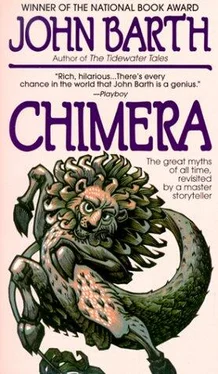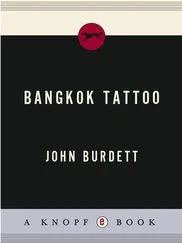John Barth - Chimera
Здесь есть возможность читать онлайн «John Barth - Chimera» весь текст электронной книги совершенно бесплатно (целиком полную версию без сокращений). В некоторых случаях можно слушать аудио, скачать через торрент в формате fb2 и присутствует краткое содержание. ISBN: , Жанр: Юмористическая фантастика, на английском языке. Описание произведения, (предисловие) а так же отзывы посетителей доступны на портале библиотеки ЛибКат.
- Название:Chimera
- Автор:
- Жанр:
- Год:неизвестен
- ISBN:9780449211137
- Рейтинг книги:5 / 5. Голосов: 1
-
Избранное:Добавить в избранное
- Отзывы:
-
Ваша оценка:
- 100
- 1
- 2
- 3
- 4
- 5
Chimera: краткое содержание, описание и аннотация
Предлагаем к чтению аннотацию, описание, краткое содержание или предисловие (зависит от того, что написал сам автор книги «Chimera»). Если вы не нашли необходимую информацию о книге — напишите в комментариях, мы постараемся отыскать её.
Chimera — читать онлайн бесплатно полную книгу (весь текст) целиком
Ниже представлен текст книги, разбитый по страницам. Система сохранения места последней прочитанной страницы, позволяет с удобством читать онлайн бесплатно книгу «Chimera», без необходимости каждый раз заново искать на чём Вы остановились. Поставьте закладку, и сможете в любой момент перейти на страницу, на которой закончили чтение.
Интервал:
Закладка:
John Barth
Chimera
About The Book
Chimera is a 1972 postmodern novel by John Barth composed of three loosely connected novellas. The novellas are Dunyazadiad, Perseid and Bellerophoniad, the titles of which eponymously refer to the mythical characters Dunyazad, Perseus and Bellerophon, the last of whom slew the Chimera. This work exemplifies postmodernism, with several Q&A sessions and three diagrams (all in Bellerophoniad). Chimera won the National Book Award for Fiction in 1973.
"The Tidewater Tales," three of the great myths of all time revisited by a modern master.
Dunyazade, Scheherazade's kid sister, holds the destiny of herself and the prince who holds her captive.
Perseus, the demigod who slew the Gorgon Medusa, finds himself at forty battling for simple self-respect like any common mortal.
Bellerophon, once a hero for taming the winged horse Pegasus, must wrestle with a contentment that only leaves him wretched.
DUNYAZADIAD
1
"At this point I interrupted my sister as usual to say, 'You have a way with words, Scheherazade. This is the thousandth night I've sat at the foot of your bed while you and the King made love and you told him stories, and the one in progress holds me like a genie's gaze. I wouldn't dream of breaking in like this, just before the end, except that I hear the first rooster crowing in the east, et cetera, and the King really ought to sleep a bit before daybreak. I wish I had your talent.'
"And as usual Sherry replied, 'You're the ideal audience, Dunyazade. But this is nothing; wait till you hear the ending, tomorrow night! Always assuming this auspicious King doesn't kill me before breakfast, as he's been going to do these thirty-three and a third months.'
" 'Hmp,' said Shahryar. 'Don't take your critics for granted; I may get around to it yet. But I agree with your little sister that this is a good one you've got going, with its impostures that become authentic, its ups and downs and flights to other worlds. I don't know how in the world you dream them up.'
" 'Artists have their tricks,' Sherry replied. We three said good night then, six goodnights in all. In the morning your brother went off to court, enchanted by Sherry's story. Daddy came to the palace for the thousandth time with a shroud under his arm, expecting to be told to cut his daughter's head off; in most other respects he's as good a vizier as he ever was, but three years of suspense have driven him crackers in this one particular — and turned his hair white, I might add, and made him a widower. Sherry and I, after the first fifty nights or so, were simply relieved when Shahryar would hmp and say, 'By Allah, I won't kill her till I've heard the end of her story'; but it still took Daddy by surprise every morning. He groveled gratitude per usual; the King per usual spent the day in his durbar, bidding and forbidding between man and man, as the saying goes; I climbed in with Sherry as soon as he was gone, and per usual we spent our day sleeping in and making love. When we'd had enough of each other's tongues and fingers, we called in the eunuchs, maidservants, mamelukes, pet dogs and monkeys; then we finished off with Sherry's Bag of Tricks: little weighted balls from Baghdad, dildoes from the Ebony Isles and the City of Brass, et cetera. Not to break a certain vow of mine, I made do with a roc-down tickler from Bassorah, but Sherry touched all the bases. Her favorite story is about some pig of an ifrit who steals a girl away on her wedding night, puts her in a treasure-casket locked with seven steel padlocks, puts the casket in a crystal coffer, and puts the coffer on the bottom of the ocean, so that nobody except himself can have her. But whenever he brings the whole rig ashore, unlocks the locks with seven keys, and takes her out and rapes her, he falls asleep afterward on her lap; she slips out from under and cuckolds him with every man who passes by, taking their seal rings as proof; at the end of the story she has five hundred seventy-two seal rings, and the stupid ifrit still thinks he possesses her! In the same way, Sherry put a hundred horns a day on your brother's head: that's about a hundred thousand horns by now. And every day she saved till last the Treasure Key, which is what her story starts and ends with.
"Three and a third years ago, when King Shahryar was raping a virgin every night and killing her in the morning, and the people were praying that Allah would dump the whole dynasty, and so many parents had fled the country with their daughters that in all the Islands of India and China there was hardly a young girl fit to fuck, my sister was an undergraduate arts-and-sciences major at Banu Sasan University. Besides being Homecoming Queen, valedictorian-elect, and a four-letter varsity athlete, she had a private library of a thousand volumes and the highest average in the history of the campus. Every graduate department in the East was after her with fellowships — but she was so appalled at the state of the nation that she dropped out of school in her last semester to do full-time research on a way to stop Shahryar from killing all our sisters and wrecking the country.
"Political science, which she looked at first, got her nowhere. Shahryar's power was absolute, and by sparing the daughters of his army officers and chief ministers (like our own father) and picking his victims mainly from the families of liberal intellectuals and other minorities, he kept the military and the cabinet loyal enough to rule out a coup d'état. Revolution seemed out of the question, because his woman-hating, spectacular as it was, was reinforced more or less by all our traditions and institutions, and as long as the girls he was murdering were generally upper-caste, there was no popular base for guerrilla war. Finally, since he could count on your help from Samarkand, invasion from outside or plain assassination were bad bets too: Sherry figured your retaliation would be worse than Shahryar's virgin-a-night policy.
"So we gave up poly sci (I fetched her books and sharpened her quills and made tea and alphabetized her index cards) and tried psychology- another blind alley. Once she'd noted that your reaction to being cuckolded by your wife was homicidal rage followed by despair and abandonment of your kingdom, and that Shahryar's was the reverse; and established that that was owing to the difference in your ages and the order of revelations; and decided that whatever pathology was involved was a function of the culture and your position as absolute monarchs rather than particular hang-ups in your psyches, et cetera — what was there to say?
"She grew daily more desperate; the body-count of deflowered and decapitated Moslem girls was past nine hundred, and Daddy was just about out of candidates. Sherry didn't especially care about herself, you understand — wouldn't have even if she hadn't guessed that the King was sparing her out of respect for his vizier and her own accomplishments. But beyond the general awfulness of the situation, she was particularly concerned for my sake. From the day I was born, when Sherry was about nine, she treasured me as if I were hers; I might as well not have had parents; she and I ate from the same plate, slept in the same bed; no one could separate us; I'll bet we weren't apart for an hour in the first dozen years of my life. But I never had her good looks or her way with the world- and I was the youngest in the family besides. My breasts were growing; already I'd begun to menstruate: any day Daddy might have to sacrifice me to save Sherry.
"So when nothing else worked, as a last resort she turned to her first love, unlikely as it seemed, mythology and folklore, and studied all the riddle/puzzle/secret motifs she could dig up. 'We need a miracle, Doony,' she said (I was braiding her hair and massaging her neck as she went through her notes for the thousandth time), 'and the only genies I've ever met were in stories, not in Moormans'-rings and Jews'-lamps. It's in words that the magic is — Abracadabra, Open Sesame, and the rest — but the magic words in one story aren't magical in the next. The real magic is to understand which words work, and when, and for what; the trick is to learn the trick.'
Читать дальшеИнтервал:
Закладка:
Похожие книги на «Chimera»
Представляем Вашему вниманию похожие книги на «Chimera» списком для выбора. Мы отобрали схожую по названию и смыслу литературу в надежде предоставить читателям больше вариантов отыскать новые, интересные, ещё непрочитанные произведения.
Обсуждение, отзывы о книге «Chimera» и просто собственные мнения читателей. Оставьте ваши комментарии, напишите, что Вы думаете о произведении, его смысле или главных героях. Укажите что конкретно понравилось, а что нет, и почему Вы так считаете.












